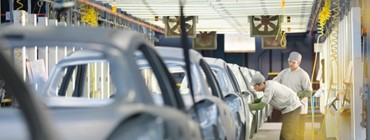Trends on the automotive market
In recent years, we have seen technological evolution in cars, with particular emphasis on improving efficiency, safety and driving comfort.
Changes in the automotive industry are expected to continue in the coming years. Although electric cars are an important area of development, innovations related to traditional combustion vehicles are also developing. Car electronics, intelligent security systems, as well as modern mechanical solutions are areas that will continue to influence the demand for car parts. It is also worth noting that trends related to ecology and sustainable development influence the automotive industry. Parts with a lower environmental impact, such as those made from renewable or recycled materials, may become popular.
The future of demand for services and products in the automotive industry, including car parts, will be strongly determined by technological progress, cultural changes, and the growing demand for solutions consistent with the principles of sustainable development. Companies operating in this industry must be ready to adapt to the dynamically changing environment to effectively meet the expectations of increasingly demanding consumers.
Based on reports on the automotive industry, below we have selected the latest information from the industrial, commercial and automotive services sectors.
Auto parts manufacturers showed optimism in their forecasts for 2023. However, almost one fifth of them predicted declines. The first quarter of this year confirmed these forecasts, because compared to the previous year, as many as 77.2% of respondents recorded an increase in sold production. This is very positive information, especially since almost one third of respondents recorded increases above 10%. Nearly 20% of respondents recorded a decline, but only every twentieth of them recorded declines above 10%. These results are consistent with the recovery of vehicle production in Europe.
The increase in product prices resulted in an increase in producers' revenues and profitability. Almost 80% of respondents confirmed an increase in average product prices compared to the previous year. This price increase resulted from price negotiations between parts manufacturers and car companies, which were under pressure from rising costs and deteriorating profitability.
Part manufacturing costs have increased in recent months, with more than 90% of manufacturers reporting increases in average manufacturing cost rates, and more than half of them reporting increases of more than 10%. This increase was due to inflation and increases in energy costs.
Support opportunities for the automotive industry
Various forms of external financing enable adaptation to these changes. One of the competitions that may support the implementation of market trends into economic practice is the A2.2.1 competition: Investments in the implementation of environmental technologies and innovations, including those related to the Circular Economy from KPO. The aim of the competition is to co-finance projects supporting the transformation of companies towards a circular economy. Two competitions are planned:
- one investment addressed to SMEs organized by the Polish Agency for Enterprise Development (PARP),
- the second one of a research nature addressed to large enterprises, organized by the National Center for Research and Development (NCBR).
The Polish Agency for Enterprise Development is to focus its activities on supporting investments enabling the introduction of environmentally friendly technologies - in particular those related to the circular economy. These investments are intended to contribute to improving material management, increasing energy efficiency and changing the approach of enterprises towards waste minimization (zero waste). The competition also aims to reuse raw materials, thus drawing attention to a more responsible approach to resources.
The National Centre for Research and Development will support research and development projects that will aim to develop technologies enabling the effective use of waste as secondary raw materials.
Both recruitment processes are scheduled to start in the first quarter of 2024. The budget of the PARP competition is approximately PLN 360 million, and the budget of the NCBR competition is approximately PLN 350 million.
At this moment, implementing regulations regarding the above-mentioned projects have not been announced yet. The automotive industry, which uses many types of plastics in production - including plastics - can benefit from the announced recruitment and implement solutions enabling their reuse, contributing to the creation of a circular economy.
We now encourage all companies interested in modifying their current business activities towards a circular economy to contact the PwC State Aid Team. We will be happy to answer any questions you have regarding this recruitment or present other support mechanisms in this area.

